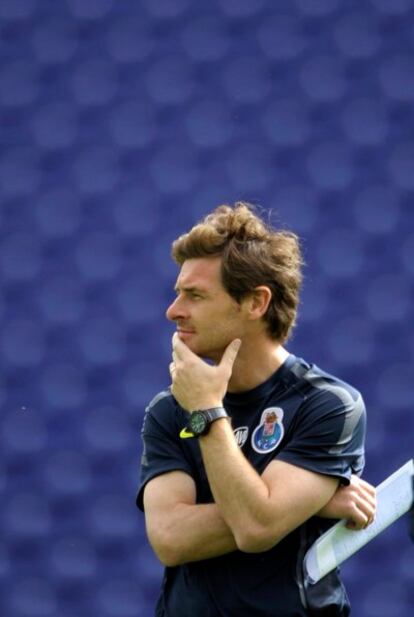Porto's precocious disciple
André Villas-Boas learned from Mourinho and is now bettering the Special One's feats
When FC Porto coach Luis André Villas-Boas was a teenager, he lived in the same apartment block as Bobby Robson, coach of the Portuguese league side between 1994 and 1996. Whenever the young Villas-Boas and Robson crossed paths they would exchange tactical commentaries. Villas-Boas, at 16, did not lack confidence when speaking to the former Ipswich Town, England, PSV and Sporting Lisbon coach: "I don't understand why you don't play Domingos Paciencia [the current coach of Sporting Braga] more often."
Robson, intrigued by the young upstart and his mastery of the English language, gave him a job as an analyst at Porto. Villas-Boas obtained his Uefa coaching badges in Scotland at the age of 17 and today, at 33, he is the youngest coach in the Portuguese league. He could also become the youngest coach to win a Uefa club competition on Wednesday night when Porto plays Braga in Dublin for the Europa League title (Cuatro, 8.45pm). His side won the league without losing a match all season- something unheard of since Benfica achieved the feat in 1972-73- and on Sunday it may be in the position to attempt a treble against Vitória de Guimarães in the Portuguese Cup final.
Comparisons to José Mourinho are inevitable; the self-styled Special One won the same treble in 2003, setting a record of 33 matches unbeaten that Villas-Boas has bettered this term. The man from Setúbal gave Villas-Boas his apprenticeship at Porto, Chelsea and Inter. Like Mourinho, Villas-Boas had little managerial experience before being plucked from obscurity by Porto. Mourinho was lured from União de Leiria; Villas-Boas from Académica de Coimbra. His only previous employment as a first-team coach was a brief stint in charge of the British Virgin Islands almost a decade previously.
Like Mourinho, Villas-Boas did not excel as a player. The Real Madrid coach made fewer than 100 appearances for Portuguese teams lacking a household name. Villas-Boas never played professionally.
Despite their lengthy relationship, Mourinho does not hold forth on his disciple's achievements, even if Villas-Boas is perfectly willing to say that he learned much from the machinating maestro.
In tactical terms, the two coaches are quite different. Mourinho's teams prefer to give the ball away and defend as a unit, seeking to break through opponents on the counter. Villas-Boas' Porto plays a more expansive style. "He looks for tactical solutions through possession and a passing style," says Racing Santander coach Marcelino, who spent a week last year observing Villas-Boas' methods. "Everything is done with organization, coherence and very clear ideas. The players speak very well of his training sessions and of his personality. You see a real team," he adds.
That was in evidence in the Europa League semifinals against Villarreal, when Porto tore the Spanish side to shreds in a 5-1 first-leg win.
Tonight's match is the 10th time Porto has contested a European final; it has been successful on four occasions, winning two European Cups, a Uefa Cup and a European Supercup. Braga, by contrast, is playing its first continental final and seeking a first trophy since a Portuguese Cup success in 1966.
The two sides have met on 131 occasions, with Porto winning 92 times and 22 matches ending in a tie. Porto striker Falcão could well provide the final say in matters; the Colombian has scored a staggering 16 times in the Europa League this season, breaking Jürgen Klinsmann's record in the competition. If Braga, the Archbishops, is to have a prayer of defeating a second Portuguese big gun after its semifinal win over Benfica, it will likely need Guilherme Artur to repeat his heroics during a campaign in which he has kept eight clean sheets in nine matches.
Whatever the outcome, it seems certain that Villas-Boas will move on to greater things in Europe in due course. Mourinho could soon be just one of the Special Ones.

Tu suscripción se está usando en otro dispositivo
¿Quieres añadir otro usuario a tu suscripción?
Si continúas leyendo en este dispositivo, no se podrá leer en el otro.
FlechaTu suscripción se está usando en otro dispositivo y solo puedes acceder a EL PAÍS desde un dispositivo a la vez.
Si quieres compartir tu cuenta, cambia tu suscripción a la modalidad Premium, así podrás añadir otro usuario. Cada uno accederá con su propia cuenta de email, lo que os permitirá personalizar vuestra experiencia en EL PAÍS.
¿Tienes una suscripción de empresa? Accede aquí para contratar más cuentas.
En el caso de no saber quién está usando tu cuenta, te recomendamos cambiar tu contraseña aquí.
Si decides continuar compartiendo tu cuenta, este mensaje se mostrará en tu dispositivo y en el de la otra persona que está usando tu cuenta de forma indefinida, afectando a tu experiencia de lectura. Puedes consultar aquí los términos y condiciones de la suscripción digital.








































